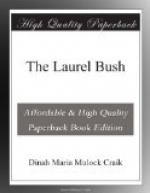Especially, as not long after David appeared, there happened a certain thing to all but her, and yet to her it was, for the time being, utterly overwhelming. It absorbed all her thoughts into one maddened channel, where they writhed and raved and dashed themselves blindly against inevitable fate. For the first time in her life this patient woman felt as if endurance were not the right thing; as if wild shrieks of pain, bitter outcries against Providence, would be somehow easier, better: might reach His throne, so that even now He might listen and hear.
The thing was this. One day, waiting for some one beside the laurel bush at her gate—the old familiar bush, though it had grown and grown till its branches, which used to drag on the gravel, now covered the path entirely—she overheard David explaining to Janetta how he and his brothers and Mr. Roy had made the wooden letter-box, which actually existed still, though in very ruinous condition.
“And no wonder, after fifteen years and more. It is fully that old, isn’t it Miss Williams? You will have to superannuate it shortly, and return to the old original letter-box—my letter-box, which I remember so well. I do believe I could find it still.”
Kneeling down, he thrust his hand through the thick barricade of leaves into the very heart of the tree.
“I’ve found it; I declare I’ve found it; the identical hole in the trunk where I used to put all my treasures—my ‘magpie’s nest,’ as they called it, where I hid every thing I could find. What a mischievous young scamp I was!”
“Very,” said Miss Williams, affectionately, laying a gentle hand on his curls—“pretty” still, though cropped down to the frightful modern fashion. Secretly she was rather proud of him, this tall young fellow, whom she had had on her lap many a time.
“Curious! It all comes back to me—even to the very last thing I hid here, the day before we left, which was a letter.”
“A letter!”—Miss Williams slightly started—“what letter?”
“One I found lying under the laurel bush, quite hidden by its leaves. It was all soaked with rain. I dried it in the sun, and then put it in my letter-box, telling nobody, for I meant to deliver it myself at the hall door with a loud ring—an English postman’s ring. Our Scotch one used to blow his horn, you remember?”
“Yes,” said Miss Williams. She was leaning against the fatal bush, pale to the very lips, but her veil was down—nobody saw. “What sort of a letter was it, David? Who was it to? Did you notice the handwriting?”
“Why, I was such a little fellow,” and he looked up in wonder and slight concern, “how could I remember? Some letter that somebody had dropped, perhaps, in taking the rest out of the box. It could not matter—certainly not now. You would not bring my youthful misdeeds up against me, would you?” And he turned up a half-comical, half-pitiful face.




